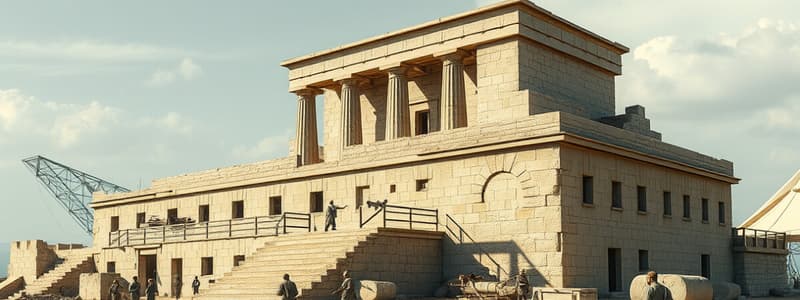Podcast
Questions and Answers
What does it mean to be civilized?
What does it mean to be civilized?
Being civilized means having developed social, political, and economic structures that promote order and interaction among people.
How does the availability of resources affect the development of civilizations?
How does the availability of resources affect the development of civilizations?
The availability of resources allows for agriculture, trade, and population growth, which are essential for the development of civilizations.
How do institutions affect human behavior?
How do institutions affect human behavior?
Institutions, such as governments and religions, shape human behavior by providing rules, norms, and values.
How do geographic factors affect how people live?
How do geographic factors affect how people live?
Which of the following rivers is associated with Egyptian civilization?
Which of the following rivers is associated with Egyptian civilization?
Which document is considered a significant piece of ancient literature from Mesopotamia?
Which document is considered a significant piece of ancient literature from Mesopotamia?
The Harappan civilization is named after the Indus River.
The Harappan civilization is named after the Indus River.
What is the significance of the term 'caste system' in Indian civilization?
What is the significance of the term 'caste system' in Indian civilization?
Which river is associated with ancient China?
Which river is associated with ancient China?
What is one impact of the Neolithic Revolution on civilization?
What is one impact of the Neolithic Revolution on civilization?
The Epic of Gilgamesh is considered similar to the Bible in certain aspects.
The Epic of Gilgamesh is considered similar to the Bible in certain aspects.
Flashcards are hidden until you start studying
Study Notes
Essential Questions of Ancient Civilizations
- Definition of civilization includes organized societies with governance, social structure, and cultural development.
- Resource availability such as water, fertile land, and raw materials significantly influences civilization growth.
- Institutions like governments, religions, and educational systems shape human behavior and societal organization.
- Geographic factors determine settlement patterns, economic activities, and cultural exchanges.
Ancient Civilizations and Geography
- Ancient civilizations include China, India, Mesopotamia, and Egypt, often situated near significant rivers like Tigris, Euphrates, Nile, Huang He, and Indus.
- Major geographical features include Jerusalem, Judea, Harappa, Mohenjo-Daro, and Mesopotamia.
Chronology
- Early Chinese dynasties include the Xia (disputed), Shang, and Zhou, indicating a historical progression in governance.
- Mesopotamian civilizations developed around the Tigris and Euphrates rivers, fostering agriculture and urbanization.
Significant Documents
- Book of the Dead: Ancient Egyptian funerary text aiding souls in the afterlife.
- Epic of Gilgamesh: Mesopotamian epic poem exploring themes of heroism and mortality.
- Hammurabi’s Code: One of the earliest legal codes from Babylon emphasizing justice and governance.
- Rosetta Stone: Key artifact for deciphering Egyptian hieroglyphics, crucial for understanding ancient Egypt.
- Ten Commandments: Ethical guidelines central to Hebrew society and Judaism.
- Torah: The central reference of the religious Judaic tradition.
- Vedas: Ancient scriptures of Hinduism, containing hymns, philosophy, and guidance.
Key Events and Time Periods
- Harappan period: Indus Valley civilization known for urban planning and advanced drainage systems.
- Paleolithic Era: Characterized by nomadic hunter-gatherer societies.
- Vedic period: Emergence of Vedic texts and early Hinduism in India.
Influential People
- Abraham: Patriarch of the Hebrew people and key figure in monotheism.
- Confucius: Philosopher emphasizing ethics and proper governance in ancient China.
- Cyrus: Persian king known for his conquests and the establishment of a vast empire.
- Khufu: Pharaoh famed for constructing the Great Pyramid of Giza.
- Tutenkhamen: Young pharaoh with a richly furnished tomb that provided insights into ancient Egyptian culture.
Important Terms
- Artifacts: Objects made or used by humans in the past; valuable for archaeological study.
- Barter economy: A system where goods and services are exchanged directly without currency.
- Caste system: Social hierarchy in India, reinforcing social stratification.
- Dynasty: A sequence of rulers from the same family lineage.
- Ethical monotheism: Monotheistic belief systems emphasizing morality and ethical behavior.
Themes of Ancient Civilizations
1.1—How Civilization Began
- Paleolithic nomads relied on hunting and gathering for sustenance.
- The Neolithic Revolution marked a transition to agriculture, enabling permanent settlements.
- BCE (Before Common Era) and CE (Common Era) are secular terms for time referencing.
- Eight features of civilization include urban centers, organized governments, complex religions, job specialization, social classes, arts and architecture, public works, and writing.
1.2—Mesopotamian Civilization
- Civilizations emerged near rivers due to water access, fertile soil, and transportation.
- The Epic of Gilgamesh parallels biblical stories, reflecting universal themes of humanity.
- Persians benefited from Lydian advancements in coinage and commerce.
- Phoenicians excelled in maritime trade and cultural exchanges, facilitating cultural diffusion.
1.3—Egyptian Civilization
- Black land (fertile) versus red land (desert) influenced agricultural practices and settlement.
- The Nile River's predictability was vital for Egyptian agriculture and civilization.
- Egyptian social structure included pharaohs, priests, nobles, and laborers with a clear hierarchy.
- Ahkenaton's religious reforms shifted traditional polytheism towards worship of a single deity.
1.4—Hebrew Civilization
- The prophet's selection of a king illustrates the intertwining of religion and governance in Hebrew society.
- The diaspora refers to the dispersion of Jews beyond Israel, impacting cultural identity.
1.5—Indian Civilization
- Harappan Civilization is named after the city of Harappa, central to its archaeological findings.
- Harappan writing remains undeciphered, posing challenges to understanding their culture.
- Artifacts reveal the sophistication of Harappan life, including musical instruments and toys, suggesting cultural richness.
- Evidence points to strong governance due to planned city layouts and advanced infrastructure in Harappa and Mohenjo-Daro.
1.6—Chinese Civilization
- The Xia dynasty's existence is debated among historians.
- Shang dynasty showcased advancements in metallurgy and stoneworking.
- Zhou dynasty, also known as the "Warring States period," illustrates a shift from centralized to fragmented power.
- Confucius advocated for virtuous leadership based on ethical conduct, while Hanfeizi and Laozi presented contrasting views on governance focusing on legalism and harmony, respectively.
- The concept of five relationships emphasizes social order and familial duty in Confucian thought.
Studying That Suits You
Use AI to generate personalized quizzes and flashcards to suit your learning preferences.




